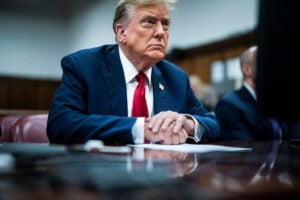
(Photo
by
Jabin
Botsford/The
Washington
Post/Bloomberg
via
Getty
Images)
Alvin
Bragg’s
criminal
case
against
Donald
Trump
has
received
as
much
press
coverage
as
just
about
any
trial.
Despite
that,
you
have
no
idea
what’s
going
on
in
the
courtroom.
That’s
true
for
two
reasons:
First,
trials
are
tedious.
There
are,
of
course,
occasional
fireworks,
but
those
are
few
and
far
between.
For
the
most
part,
trials
are
long
sessions
of
boring
questions
with
people
reading
from
documents.
(That
explains,
in
part,
why
Trump
is
sleeping
through
parts
of
his
trial.
Trials
are
dull.)
Press
reports,
unlike
trials,
cannot
be
tedious.
If
press
reports
were
boring,
then
no
one
would
read
(or
listen
to)
them.
Thus,
by
definition,
what
you
hear
in
the
press
is
a
condensed,
and
much
more
interesting,
version
of
the
trial
than
is
actually
occurring.
Moreover,
the
press
reports
are
focusing
on
what
the
reporter
thinks
is
interesting.
You
have
no
idea
whether
that’s
what
any
particular
juror
thought
was
interesting.
Second,
as
a
general
matter,
you
always
think
that
your
side
is
winning
at
trial.
Through
four
decades
as
a
litigator,
I’ve
sat
through
an
awful
lot
of
trials
in
my
life.
(Admittedly,
those
have
all
been
civil
cases;
perhaps
criminal
cases
are
different.)
During
all
of
those
trials,
the
team
on
my
side
of
the
“v”
has
always
thought
that
we
were
winning.
That’s
perfectly
natural,
and
it
happens
for
two
reasons.
The
first
reason
is
that
you’ve
been
studying
your
side
of
the
case
for
years.
You
know
the
answers
to
everything
the
other
side
says.
You’ve
come
to
believe
that
your
side
is
right.
The
second
reason
has
to
do
with
groupthink.
Suppose
your
side
has
a
terrible
day
at
trial.
Your
witness
was
destroyed
on
cross-examination.
Your
team
assembles
for
dinner.
Everyone
is
despondent.
Somebody
says
that
one
aspect
of
the
day
actually
was
okay
for
your
side.
Another
person
latches
on
to
that
point.
A
third
person
notes
something
else
that
went
well
that
day.
By
the
end
of
dinner,
you’ve
all
convinced
yourself
that
things
were
not
so
grim;
the
day
pretty
much
played
to
a
draw.
And
you
should
see
how
dinner
sounds
on
trial
days
that
actually
went
well
for
you.
People
don’t
want
to
focus
on
the
negative,
so
they
convince
themselves
that
they’re
doing
better
than
they
are.
So,
too,
with
television
coverage
of
trials.
MSNBC
and
Fox
News
each
have
slanted
coverage
to
begin
with.
Their
viewers
don’t
want
to
be
burdened
with
hearing
that
their
side
is
losing.
Independent
of
that,
each
station’s
panels
of
pundits
are
filled
with
folks
who
hold
similar
political
views.
The
one
defense
lawyer
on
an
MSNBC
panel
is
quickly
shouted
down
by
the
six
other
panelists
convinced
that
Trump
is
being
destroyed
at
trial.
On
Fox
News,
it’s
exactly
the
opposite.
Thus,
Fox
News
viewers
are
hearing,
more
or
less,
that,
“The
judge
today
threatened
to
put
Donald
Trump,
a
leading
candidate
for
the
presidency,
in
jail.
Just
for
speaking!”
On
MSNBC,
exactly
the
same
events
are
cast,
more
or
less,
as,
“Donald
Trump
once
again
took
to
social
media
to
intimidate
witnesses.
If
Trump
were
a
typical
defendant,
he’d
already
be
in
jail.
It’s
unbelievable
that
the
judge
hasn’t
yet
locked
him
up!”
On
MSNBC,
Keith
Davidson,
Stormy
Daniels’
former
lawyer,
testified
about
the
seedy
underside
of
the
publishing
industry
and
the
money
that
changed
hands
to
conceal
stories
about
Trump’s
affairs.
Trump
was
engaged
in
filthy
business.
On
Fox,
you’ll
hear
that
Davidson
wanted
to
get
paid
before
the
election
because
he
had
more
leverage
then.
“See?
Leverage!
It
was
all
just
a
matter
of
extorting
money
from
Trump.”
On
Fox,
Hope
Hicks
testified
that
Trump
wanted
to
prevent
newspaper
reports
about
Stormy
Daniels
from
reaching
the
White
House
residence,
so
Melania
wouldn’t
be
enraged
by
the
reporting.
“See?
It’s
all
about
Melania!
This
had
nothing
to
do
with
the
election!
Trump
was
concerned
only
that
his
wife
would
be
upset
by
the
Stormy
Daniels
news.”
On
MSNBC,
Hicks
conceded
that
Trump
was
concerned
about
how
the
Stormy
Daniels
story
would
affect
the
election,
so
the
payment
of
hush
money
was
election
interference.
Trump
worried
about
his
wife’s
reaction,
too,
but
that
really
doesn’t
matter:
If
a
payment
served
two
purposes,
one
related
to
an
election
and
one
not,
it’s
still
a
crime
to
conceal
that
payment.
Liberals
and
conservatives
live
in
two
different
universes
on
the
best
of
days.
But
those
two
universes
have
been
pulled
even
further
apart
by
coverage
of
the
ongoing
trial.
Which
means
one
thing:
At
the
end
of
the
trial,
one
side
or
the
other
is
going
to
be
startled,
and
dismayed,
to
learn
that
their
side
lost.
Mark Herrmann
spent
17
years
as
a
partner
at
a
leading
international
law
firm
and
later
oversaw
litigation,
compliance
and
employment
matters
at
a
large
international
company.
He
is
the
author
of
The
Curmudgeon’s
Guide
to
Practicing
Law and Drug
and
Device
Product
Liability
Litigation
Strategy (affiliate
links).
You
can
reach
him
by
email
at inhouse@abovethelaw.com.

